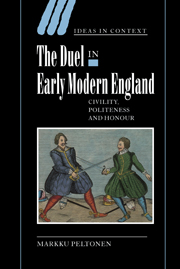Book contents
- Frontmatter
- Contents
- Acknowledgements
- Introduction
- 1 The rise of civil courtesy and the duelling theory in Elizabethan and early Stuart England
- 2 The Jacobean anti-duelling campaign
- 3 Duelling, civility and honour in Restoration and Augustan England
- 4 Anti-duelling campaigns 1660–1720
- 5 Politeness, duelling and honour in Bernard Mandeville
- Epilogue
- Bibliography
- Index
- IDEAS IN CONTEXT
3 - Duelling, civility and honour in Restoration and Augustan England
Published online by Cambridge University Press: 22 September 2009
- Frontmatter
- Contents
- Acknowledgements
- Introduction
- 1 The rise of civil courtesy and the duelling theory in Elizabethan and early Stuart England
- 2 The Jacobean anti-duelling campaign
- 3 Duelling, civility and honour in Restoration and Augustan England
- 4 Anti-duelling campaigns 1660–1720
- 5 Politeness, duelling and honour in Bernard Mandeville
- Epilogue
- Bibliography
- Index
- IDEAS IN CONTEXT
Summary
‘Thogh the English’, reflected one commentator in 1683, ‘have been accounted from all times, one of the most polite Nations of Europe, yet I am fully perswaded they have so far improved themselves in the Art of all civil Converse, since His Majesties Happy restoration, that if we compare them now, to what formerly they were, we shall have reason to wonder how so a great change to the better could happen in so short a time.’ This constant change of manners, the same commentator thought, made it ‘superfluous, or at least of little use to prescribe Rules or Ceremonies, that change not only every Age, but almost every Year’.
Whilst these contentions are highly debatable, the more general idea which underlay them that civility and politeness occupied a central place in Restoration and Augustan England cannot be questioned. Although these themes had been widely discussed in the late sixteenth and early seventeenth century, there is little doubt that after 1660 this discussion was even more vociferous. Many recent commentators have argued, as we saw in the Introduction, that these accounts of civility and politeness in the late seventeenth and early eighteenth century introduced ‘a new definition of civility’, ‘new standards of conduct’ or ‘an explicitly innovative concept of social refinement – politeness’. In contrast to these arguments, I seek to show the striking similarities between the Restoration and Augustan concepts and those of the earlier period.
- Type
- Chapter
- Information
- The Duel in Early Modern EnglandCivility, Politeness and Honour, pp. 146 - 200Publisher: Cambridge University PressPrint publication year: 2003

